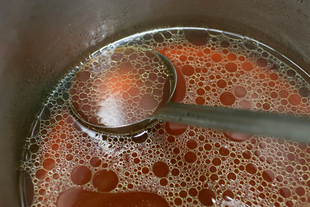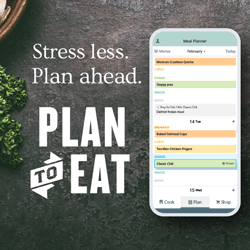
Here at the Nourishing Herbalist, we consider bone broth to be among the top 10 superfoods. Surprised? No other prepared food can boast of easily-assimilated vital minerals like calcium, magnesium, phosphorus and ideal substances for structural (bone) health like gelatin and collagen.
This easy-to-make broth allows us to serve our family a tasty nutritional whole food that's versatile and provides substances that otherwise might be difficult to obtain. Take calcium for instance. Dairy products are often our greatest source of calcium but with the many dairy allergies out there the only other calcium-rich food group tends to be leafy greens and broccoli. Last time we checked, that food group isn't always the most popular with little ones.
(Though if you are able to introduce such foods to your child at a very early age you'll find they will eat them -- ask us how we know. Bonus points if you eat them yourself!)
As for gelatin… well, a box of Jell-O could arguably offer similar benefits but when the sugar, artificial flavoring and food coloring is factored in it winds up with a big fat zero in the real food category. However, what if we told you that this incredible broth is just as easy to make as Jell-O? Are you interested?
You'll find a wide-variety of our recipes use bone broth so we'll refer back to this recipe often. Feel free to experiment with different flavor combinations based on the herbs and vegetables you choose to use.
Frugal tip: Keep a container in your freezer for leftover raw vegetable pieces discarded from other uses -- vegetable peelings, carrot tops, flawed celery sticks, celery bottoms, stems, skins, etc. Instead of tossing these pieces into the trash, collect them in your freezer container and use them at a later time in your broth.
The reason you begin with a cold water soak is to dissolve some proteins in the bones, albumin specifically, which only dissolve in cold water. The addition of vinegar is to assist in breaking down bone cartilage (so as to get better gelatin in your broth) and also to facilitate the release of the vitamins and minerals stored in the bones. In addition, vinegar can help preserve the broth to some extent.
It's important to use raw apple cider vinegar (like Bragg) as it contains the cultures (bacteria) that are helpful to these processes. The good news is the ratio of vinegar to broth is great enough that you won't even notice it's presence in the broth. Ask me how I know. (Vinegar just happens to be a husband-repellant in my home -- he won't come within 50 feet of the kitchen if he notices I'm using it -- but he will eat the broth with no problem.)
So with no further ado, I give you...
Nourishing Bone Broth
- 2-5lbs of bones. (We use either organic beef marrow bones or the leftover carcass from a roasted chicken)
- Cold water to fill your crockpot.
Add:
- Leftover root vegetables (especially onions and carrots)
- 1 ounce of Astragulus root or combination of herbs
- Garlic cloves to taste
- 2 T raw apple cider vinegar ( I use Braggs)
Directions:
Cover and let sit for 1 hour. Then, turn crockpot to low and cook for 12-24 hours. Allow broth to cool. Optional: skim fat off the top and use separately or discard. Strain broth.
Use in your favorite soup recipes or one of ours, as an addition to stir-fry, or by itself!
If you attempt to make the broth and find your final product lacks the gelatinous texture, take a peek at Stephanie's article for more information.




 RSS Feed
RSS Feed
